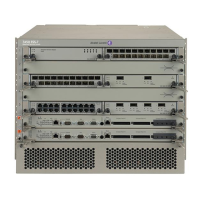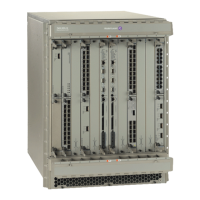Configuring IP Router Parameters
32 Router Configuration Guide
IPv6 Address Format
IPv6 uses a 128-bit address, as opposed to the IPv4 32-bit address. Unlike IPv4 addresses,
which use the dotted-decimal format, with each octet assigned a decimal value from 0 to 255,
IPv6 addresses use the colon-hexadecimal format X:X:X:X:X:X:X:X, where each X is a 16-
bit section of the 128-bit address. For example:
2001:0DB8:0000:0000:0000:0000:0000:0000
Leading zeros must be omitted from each block in the address. A series of zeros can be
replaced with a double colon. For example:
2001:DB8::
The double colon can only be used once in an address.
The IPv6 prefix is the part of the IPv6 address that represents the network identifier. The
network identifier appears at the beginning of the IP address. The IPv6 prefix length, which
begins with a forward slash (/), shows how many bits of the address make up the network
identifier. For example, the address 1080:6809:8086:6502::1/64 means that the first 64 bits
of the address represent the network identifier; the remaining 64 bits represent the node
identifier.
Flow Label 24-bit flow label.
Payload Length 16-bit unsigned integer. The length of payload, for example, the rest of the packet
following the IPv6 header, in octets. If the value is zero, the payload length is carried
in a jumbo payload hop-by-hop option.
Next Header 8-bit selector. Identifies the type of header immediately following the IPv6 header.
This field uses the same values as the IPv4 protocol field.
Hop Limit 8-bit unsigned integer. Decremented by 1 by each node that forwards the packet. The
packet is discarded if the hop limit is decremented to zero.
Source Address 128-bit address of the originator of the packet.
Destination Address 128-bit address of the intended recipient of the packet (possibly not the ultimate
recipient if a routing header is present).
Table 3: IPv6 Header Field Descriptions (Continued)
Field Description
